I awoke in the morning with a cumbersome sense of sadness and despair. I’d been dreaming of a massacre of what at first I thought were some of the world’s political leaders. They were being piled up to be killed. Just as I awoke, I realised that in fact they were the cast of EastEnders. Distraught, I followed my usual morning routine of preparing a mason jar of ginger, lemon, honey and cider vinegar and wiled away some time on Facebook. Scrolling down the page on my laptop my heart would lurch from joy to sadness as images of beauty and pain all seemed to merge into one.Then, the inevitable moment after breakfast of questions such as “what do I want to do with my life,” “what job shall I apply for today, knowing I probably won’t even get to interview phase,” “is the economic system, and the whole edifice upon which the country, continent, and world that both enables and inhibits my life, about to collapse?” This sense of malaise permeated my very being, as the sun poured through the window, illuminating my unemployed status.
Having decided that starting from such a gloomy space was hardly the most conducive to selling myself to the machine in the hope of someone employing me to be a part of it, I decided that I would venture out into London in order to research for my blog, which had been lying dormant for a few months. A while ago, I had met a comedian dressed as a unicorn at a tiny festival in Kent . A few weeks later, we were sat together at a small pub in South London, waiting her turn to perform. She told me that she was thinking of buying a place in Anerley. Having never heard of it, I decided then that I would include it in my series of posts entitled Uncover London. After my sombre breakfast, I packed my camera, a notebook, pen, bottle of water and a copy of Ekhart Tolle’s The Power of Now and dressed myself in several layers of clothing in order to brave the freezing temperature that lay beyond the door.
Whilst shivering on the sun adorned platform in Kilburn, my heart began to lift a little at the community gardens that bloomed with herbs planted by the local Transition Town and London underground staff. A sign above read, “feel free to pick the food, it’s free (just leave enough for others).” Amongst the atomisation propelled by neo-liberalism, there was evidence of communities working altruistically, nourishing us through nature. I helped myself to a small bunch of purple sage, which I put in my purse with a warm sense of gratitude. Knowing that I had around 20 minutes on the tube before I changed at Canada Water, I pulled out Tolle’s seminal book. I’d first read The Power of Now many years ago, when I was 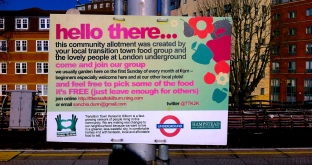 in the depths of depression. It had made sense to me but I was so entrenched in the darkness and an all-encompassing grey cloud that I couldn’t truly absorb the wisdom that Tolle was imparting. As the train moved under the city, tears began to roll down my cheeks. I was ready to end my enslavement to incessant thinking, which had created the illusion of my-self and that it wasn’t going to be as hard as I’d anticipated. A space had been opened in which I may be liberated, and new levels of consciousness experienced.
in the depths of depression. It had made sense to me but I was so entrenched in the darkness and an all-encompassing grey cloud that I couldn’t truly absorb the wisdom that Tolle was imparting. As the train moved under the city, tears began to roll down my cheeks. I was ready to end my enslavement to incessant thinking, which had created the illusion of my-self and that it wasn’t going to be as hard as I’d anticipated. A space had been opened in which I may be liberated, and new levels of consciousness experienced.
“So the single most vital step on your journey toward enlightenment is this: learn to disidentify with your mind. Every time you create a gap in the stream of mind, the light of your consciousness grows stronger.
One day you may catch yourself smiling at the voice in your head, as you would smile at the antics of a child. This means that you no longer take the content of your mind all that seriously, as your sense of self does not depend on it.” Tolle
On emerging at Anerley overground station, I walked left to a main road. At the junction lay a decrepit building, once home to Maj Spice. The Indian take-away was now boarded up, and a small bush created beautiful shadows across its shutters. After walking right down the main road for a few minutes, I decided to return in the direction I’d come from. On the other side of the bridge was another stunning empty premises, called The Attic. Beautiful blue and white facades suggested former splendour as paint peeled and signs warned of impending danger if it were to be entered by the inquisitive.
I decided to avoid the main road, and walk adjacent to the train line, down Oakfield Road, not realising that I was leaving Anerley swiftly behind and heading towards Penge. It became obvious that emptiness and abandonment were common themes in the area. To my left lay a deserted Family Planning Clinic with metal guards with unoriginal graffiti tags scrawled across them. Weeds flourished, bending slightly in the cold air. On the smaller building to the right, at the top of a once glorious window was a façade that told some of the building’s history. It had been a relief station in the 1900s. 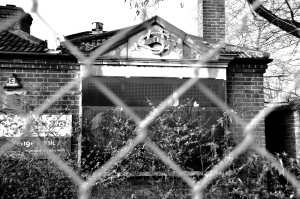 Frustratingly, the Internet has provided me with scant information other than it was recently squatted by 10-20 people, who threw a party, which annoyed a few local residents. Continuing down the road, past turnings whose signs hinted at a more bucolic era, I saw several more empty residences, all boasting beautiful facades. I also started to notice a lot of rubbish strewn around. I am always baffled as to why people have such a low level of respect for their environment. Is it really that hard to find a bin?
Frustratingly, the Internet has provided me with scant information other than it was recently squatted by 10-20 people, who threw a party, which annoyed a few local residents. Continuing down the road, past turnings whose signs hinted at a more bucolic era, I saw several more empty residences, all boasting beautiful facades. I also started to notice a lot of rubbish strewn around. I am always baffled as to why people have such a low level of respect for their environment. Is it really that hard to find a bin?
I then turned onto Penge high street, ready to eat. The energy I needed to keep me warm, despite the silk thermals, was beginning to take over. I peeped at the menu outside The Pride of Venice Café and saw nothing I really wanted. I am known amongst my close friends as the Food Police. Was Penge going to be able to cut through my particularities? Tasty Palace, next to De Niro’s Barbers also wasn’t that appetising. I wasn’t in the mood for kebabs, or fish and chips. I also realised that I was not in Anerley. This bugged me a little, as I had been imagining it since I’d met the unicorn, and here I was in Penge. It doesn’t have the same beauteous ring to it as Anerley. However, the name Penge, I later learn, derives from Celtic words meaning “head of the wood,” which would make sense as it sat atop what used to be the Great North Wood that covered most of the area to the north of Croydon. It’s one of the few Celtic place names in London, suggesting the survival of a native British contingent post Anglo-Saxon colonisation. Now that sounded far more Romantic!
Past the perfunctory Polish supermarket, I spotted a lot of cheaply priced junk outside a charity shop. I am a sucker for second-hand stuff, so I popped in for a snoop around. You can often tell a lot about an area in its local chazza. The Little Ones was very cute and organized, and full of happy shoppers. A quick skim through the ladies section was a tad disappointing, with the hangers laden with over-priced Primark, suggesting there wasn’t a great deal of money in the area. Either that, or people with a proclivity for a sweatshop-produced bargain.
Getting hungrier, I realised that variety and healthy would be words worth leaving behind for a bit, and so when I spotted in a garish looking place called The Garden Café, I entered with gusto. After a friendly Eastern European waitress took my order, of a veggie burger and builder’s tea, I went to wash my hands in the bathroom. I am also incredibly retentive when it comes to spelling and punctuation, and so I giggled with glee at the sign on the toilet door, which read: PLEASE SWITCH OF THE LIGHT. Someone had corrected it in biro, adding the extra f, which made me even happier.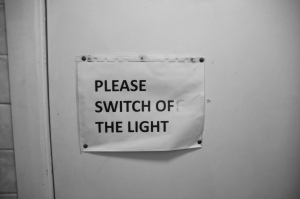 I eavesdropped on the only conversation happening, as the rest of the customers were old people, sat on their own, reading, or staring out onto the street. Two blond women, one whose voice sounded like she was either ill or smoked like a chimney, were chatting about their weekend. A fight had broken out in their local pub, and a planned retort was being built over a burger and chips. It made me wonder what people did in Penge. What was there in the form of entertainment? Where did people go raving, apart from in old squatted relief stations? Were their clubs? Was there a sense of community, or communities?
I eavesdropped on the only conversation happening, as the rest of the customers were old people, sat on their own, reading, or staring out onto the street. Two blond women, one whose voice sounded like she was either ill or smoked like a chimney, were chatting about their weekend. A fight had broken out in their local pub, and a planned retort was being built over a burger and chips. It made me wonder what people did in Penge. What was there in the form of entertainment? Where did people go raving, apart from in old squatted relief stations? Were their clubs? Was there a sense of community, or communities?
Eager to experience Anerley, I left behind the café and its customers and wandered down Maple Road. Spotting a decaying mural outside a basic travel shop, I stopped to read its words. A man insisted I took photos of it, and so I heeded his request. We then got talking, as the light slowly began to fade, and the arctic weather penetrated deeper. Abed, a Somali who had moved to Penge in the late eighties as war ripped through his land, chatted with me, all the while looking away into the distance, not once looking me in the eye. My dad was kidnapped off the coast of Somalia, I tell him. After recounting the story, I asked him some of the questions I’d wanted to ask the old people in the café. In his view, very little had changed in the area since 2008. When people’s pockets are full, you notice them emptying. Here, everyone’s pockets are empty, so none of us can tell the difference. There had been little development, and only scant decline. Later, slightly contradicting himself, he said lots of places had shut down, leaving hollow buildings, void of industry. Maple Road was a primary example of this, he said, where half the road’s shops lay empty. When I questioned him about employment rates, he said very little had changed. There weren’t that many large employers in the area anyway, and people just got by. A room in a shared flat or house averaged at around £70-80, which was markedly cheaper than anything I’d paid in the last few years in London. My cup of tea had been pretty indicative, costing a measly 80p!
Thanking Abed, I continued along the road towards Anerley despite him telling me there was nothing to see. I then met Andy outside The Maple Tree pub, whilst I took its photo. Andy had suffered a stroke recently, and his walking was significantly impaired. A widow, he ate all his main meals in the pub, where everyone knew each other by name and the landlords were kind and considerate. Hampered by age and disability, his community been reduced to the pub, and Andy appeared content enough with that. 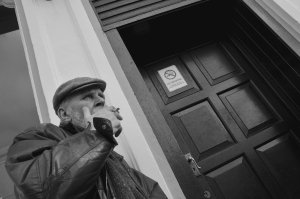 Smoking away with his tobacco-stained grey beard, he said a few drinking houses had closed along the road in the last few years, as people couldn’t afford to indulge like they used to. Returning to his drink, and the warmth, we parted.
Smoking away with his tobacco-stained grey beard, he said a few drinking houses had closed along the road in the last few years, as people couldn’t afford to indulge like they used to. Returning to his drink, and the warmth, we parted.
Eager to re-live my past adventures into London’s hidden gems, in which I’d found places of outstanding natural beauty, I spotted Bett’s park. I looped the park, smiling at one artist’s expression on the back of a garage, that shouted the word HIGH in black and white spray. How very inventive, said the snob within. Almost giving up on Anerley, primarily due to starting to lose feeling in my fingers, I saw a canal at the exit. Pumps bubbled and ducks sat sensibly on areas elevated above the water. The small stretch of water was all that remained of Croydon Canal. It had once meandered through the long lost picturesque Penge Common and Forest, but was closed 25 years after its incipience, in 1836. Rather than going back to the comfort of my home, I returned to the park as the winter sun illuminated the trees’ bare skeletons in a golden glimmer that hinted of what we could look forward to in months to come. The canal was truncated rather more rapidly than I’d hoped, so I marched on, entering the back streets of Anerley.
Abandonment, smashed glass, festering piles of rubbish and clearly defunct waste disposal services littered my vision. In an empty or trash-filled house an UKIP poster stood boldly in the window. Broken chairs, trollies filled with old carpets, plastic sheeting and general signs of decay were strewn throughout the estate. It’s hard to not judge such a mess. Did the residents have no means to take it to a dump? There was no shortage of cars parked that could have transported it to one. Had the local council neglected its responsibilities towards them and not bothered helping to clear it up? Feeling sad, I decided to leave.
On the train back into the city, I reflected on how my experiences had made me feel. I’d set off with expectations, of finding the natural beauty that I had been blessed with in Island Gardens and Boston Manor. Instead, I’d found decay and a canal leading nowhere. Intricate facades hinted at a more aesthetically glorious history, but the rubbish that littered even the hollowed out tree trunk in the park slightly tarnished the delicate designs. However, I learnt a lot that day. I would endeavour, once again, to not let the past affect the present. I had sought to emulate previous explorations in London, and that had led to temporary disappointment and had gotten in the way of my ability to see the beauty in dilapidation. After all, decay reminds us of impermanence, thus the potential for growth and change.




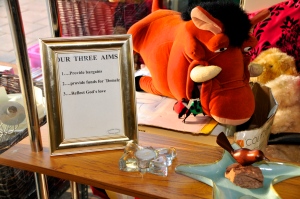















Shame, you didn’t get to experience the lovely Crystal Palace Park and the Bridge House pub where people of Penge spend most of their time. Penge is on the up and my flat which you took a photo of is £400k, and houses £600k, so not as deprived as you would think. Yes, it has a problem with rubbish and being from New Zealand, it does annoy me, but most parts of London are like that. Maybe you can come and enjoy Crystal Palace Park and Crystal Palace triangle, in summer I think you might be pleasantly surprised. Just so you are aware Anerely is on the border of Crysal Palace Park.
LikeLike
Oh wow, I took a photo of your flat? How on earth did you find my blog? I am intrigued as I don’t know how people find each other’s work. I will definitely be coming to the places you suggested. They sound very intriguing. I feel nervous that my piece didn’t convey the beauty that I saw in Anerley and Penge. I had a great day, but just saw a lot of decay too. I saw beauty in the decay. I really hoped to convey that, but feel from your comment I may have failed.
LikeLike
Lovely stuff Layla. Keep at it.
LikeLike
Thanks Barbara! I will definitely keep writing. It is a space I feel very comfortable in. x
LikeLike
A beautiful piece Layla! I thoroughly enjoyed reading it and the photos were the perfect accompaniment! I don’t know why but I am even more intrigued to read about what you are discovering in our very own capital as opposed to what you found in Central and South America??! xxx
LikeLike
Oh wow, thanks Yazz! I am so glad you enjoyed it. Your input has encouraged me to keep sharing my thoughts on exploring London. It was such a revelation to me last year to realise that I didn’t need to travel across continents in order to have a so-called different experience, as there are so many that lie outside our own front door. Thanks for reading, and sharing your thoughts.
LikeLike
Love this Layla, your writing is so descriptive I feel like I was with you. I also meant to tell you that I’ve recently come across Boston Manor House (re your last post) which is a Jacobean House in Boston Manor that is used for community and charity events – I’m yet to visit but there’s talk of a pop up there to raise money for Water Aid.
Rosie xx
LikeLike
Oooooooh, really? I will definitely come to a pop-up in Boston Manor. I absolutely loved my trip there, and if you create some delicious food, for a charity that I have a great deal of respect for, I will absolutely be there! Thanks for taking the time to read my post, and giving such positive feedback xx
LikeLike
Beautiful piece Layla, and so timely xxx
LikeLike
Enjoyed the pictures and post
Keep em coming!
LikeLike
Many thanks Simon. I really enjoyed your last post. It cracked me up!
LikeLike